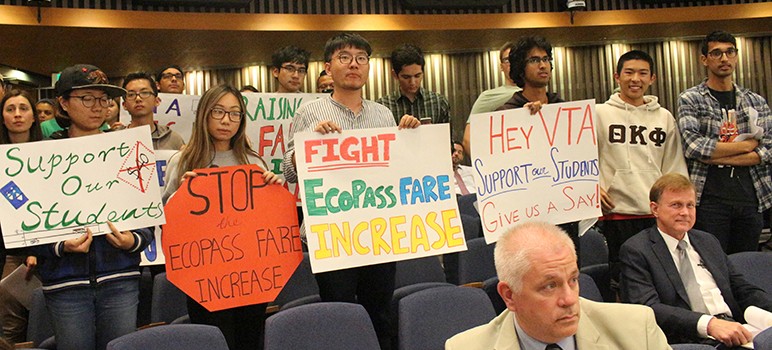De Anza College students claimed victory Thursday night by curbing a proposal to hike the cost of commuting by 440 percent.
Several dozen students and activists from the Foothill-De Anza Community College District (FHDA) attended the Valley Transportation Authority (VTA) board meeting to oppose the proposed cost increase for Eco Passes, which allow for unlimited bus, light rail and express bus services. More than 25 students gave public testimony, after which FDHA’s alternative proposal was approved by the VTA board in a nearly unanimous vote, with only county Supervisor Cindy Chavez opposed.
The compromise will result in one-time Eco Pass increases of $11—from $9 a year to $20 a year—that will be maintained for the next four years. VTA’s proposal would have quadrupled the $9 annual fee that De Anza students currently pay for the Eco Pass—raising it by $5 every year for the next seven years and freezing the price at $40.
“Not only is this a win in the long run for De Anza, because it shaves off $10 for each student at the end of four years, but it also sets the right precedent that revenue loss shouldn't be taken out on students,” said Neil McClintick, a student activist at De Anza.
The suggested price hike, announced in May, was widely criticized by students, college administrators, community activists and even Congressman Ro Khanna. The collegiate Eco Pass is one of many transit fares that face adjustment as the VTA combats projected losses and prepares to implement a vast transit overhaul after the passage of Measure B, which was approved by county voters last year.
According to the De Anza Institutional Research Office, 51 percent of the student body commutes from San Jose, and the majority resides in East San Jose, making affordable public transportation crucial for De Anza students. Community colleges also tend to have a higher percentage of students from low-income households compared to four-year schools, so equity was a key concern when observing VTA’s plan to match up Eco Pass prices at De Anza with that of San Jose State University.
During the meeting, Elias Kamal, a De Anza student trustee, said “at least 15,000 De Anza students come from a very low-income household.” He added, “Our issue is that the [Eco Pass] proposal sets every college in the district at an equal rate of $40 in spite of our vast differences in socioeconomic status and services.”
While McClintick said that the VTA’s fare adjustments are not ideal, he felt it was “still important to claim victory when you see it,” referring to the successful compromise.
Correction: A previous version of this story noted that Foothill-De Anza Community College District administrators attended the meeting. San Jose Inside regrets the error.


Good for them!!!!!!!!!!!They have learned first hand what community organizing and showing up is all about!
Baloney!
NOTHING heroic about this whatsoever. De Anza students are pure, 100% consumers of VTA services.
Consumers will ALWAYS ALWAYS ALWAYS want more for less.
Bullying a government service provider into providing more for less for YOUR tribe justs shifts the costs to someone else’s tribe.
Don’t pat yourselves on the back too hard, snowflakes. You just screwed some other poor, unsuspecting tribe.
Or as it is more commonly known- whining.
Good for them, they have learned about the free lunch at taxpayer expense. What we really need to do is let VTA die on the vine as it would at the price these bums are paying for transportation. You have a right to walk, not a free ride.
Minor correction – De Anza Admin were not present at the meeting.
Ridiculous. They can afford 40 per year for unlimited rides. I bet they spend that per month at Starbucks. VTA tries to improve their deficit and this is what happens.
What is wrong with Evergreen Valley College if all those east side SJ residents are busing to De Anza in Cupertino? And why are they whining about $20.00 a YEAR for transportation?
I’m thrilled to hear about this victory. The affordability of the Eco Pass is crucial for students like me, and the decision to limit the price hike is a huge relief. It shows that our voices matter, and I’m grateful to everyone who advocated for this change. Now, we can continue to rely on public transportation without worrying about excessive costs. Here’s to more accessible and sustainable transportation options for all
This comment is on a report published in 2017.